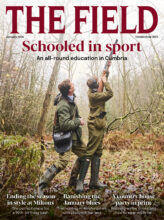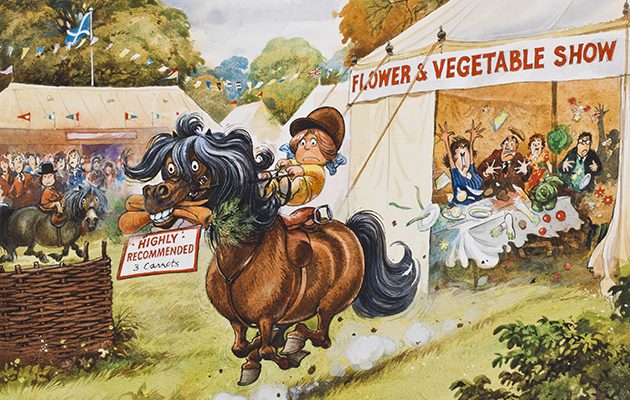To celebrate the 60th anniversary of the publication of Norman Thelwell’s first collection of cartoons, his Angels on Horseback are preparing to remount. Di Cross looks back on the country characters and quips that never fail to tickle
It’s been 60 years since Angels on Horseback was published but it hasn’t aged a day. From landscapes of the Hampshire countryside to the infamous Penelope and Kipper, Di Cross celebrates the very best of Norman Thelwell.
If you haven’t found yourself in a Thelwellian situation with a Kipper of your own, you will almost certainly have been shown up by a gundog like Gotcha. Read naughty gundogs: I’ve gotcha! to be reassured that you are far from alone.
THE 60TH ANNIVERSARY
Our first pony was a bay New Forest with an unruly black mane, thick wavy tail and a splash of white in the middle of his forehead. Hence Starlight. He had a furrowed brow and the ability to look down on you even if you towered above him. He was also one of those ponies that could get fat on air; when that failed, his ability to break into the feed shed would have impressed the Brink’s-Mat brigade.

Tightlines appeared in 1989’s Thelwell’s Sporting Prints.
Leading him and his companion home from the orchard up the road one evening, my sister, a slip of a thing, yanked his head off the grass verge, tightened the halter rope and put on a masterly display of control for the benefit of the gardener across the road. The four-legged one responded to this by applying his large, velvety nose beneath her elbow and hefting her into the ditch. Expressing her displeasure at some volume she emerged and whacked the monster. Her mistake then, of course, was to turn her back, to the small of which the large nose was reapplied and she was returned to the ditch.
“That’s a right Thelwell you’ve got there,” guffawed the gardener, much enjoying the unintentional entertainment. Future Hickstead champions both, we were not best pleased to be portrayed as Penelopes.
But therein lies the appeal of Norman Thelwell’s cartoons. They are vignettes of everyday life, capturing simple, amusing aspects of our daily existence with neither malice nor agenda. This is doubtless why, 60 years since his first collection of pony cartoons, Angels on Horseback, was published, they still appeal. The book is to be reissued in hardback this month with a new cover to mark the anniversary, along with omnibus editions Pony Cavalcade and Pony Panorama, which was republished in April. There will also be an exhibition at the German Horse Museum in Verden and, hopefully, one in the UK.

Penelope and Kipper have that “Spring feeling”.
“I don’t think my dad ever expected it to be so long lasting,” says David Thelwell, the cartoonist’s son and a fellow artist. “Most books last a few years and then that’s it. He did cartoons on every subject but it’s the pony stuff that has always captured people’s imagination. It’s partly because it’s well drawn, well observed and amusing. Even I laugh when I look through them. It’s timeless humour and not political. It’s poking fun but not being unpleasant so it’s easy to absorb.
“People have said, ‘Oh, every time I feel down I get the books out and they perk me up.’ I think that’s it, you do feel better for reading them. They are very simple ideas and although they feature ponies it’s more about human character and how we relate to each other and to animals.”
THELWELL ON HORSEBACK
Norman Thelwell, who was born in Birkenhead, Cheshire, in 1923, loved to draw from an early age and rarely travelled anywhere without a sketchbook. Pencil and paper certainly formed part of his kit when, having joined the Army in 1941, aged 18, he was posted to India with the East Yorkshire Regiment. While this period helped to hone his artistic skills – he became art editor of an Army newspaper – it did not help with his horsemanship. “He rode a horse while he was there,” explains his son, “but the horse bolted and all his mates were laughing at him as he shot past. I think that put him off riding horses for life.”
Thelwell took evening classes at Nottingham Art School after the war and then a degree at Liverpool College of Art in 1950 before going on to teach design and illustration at Wolverhampton College. He sold cartoons on occasion to magazines such as Lilliput and London Opinion, getting his big break in 1952 when satirical magazine Punch published its first Thelwell cartoon – the beginning of a 25-year relationship involving more than 1,500 cartoons and 60 front covers. Focusing on life in the countryside, they featured all manner of funny incidents.

Thelwell fishing on a lake in Wales.
“I was a sort of unofficial country cartoonist, doing funny drawings that involved birds, cattle, pigs and poultry,” he explained in his autobiography, Wrestling With a Pencil. “One day I did a pony drawing and it was like striking a sensitive nerve. The response was instantaneous.”
This first pony cartoon appeared in 1953 and the postbag exploded, producing alarm in the cartoonist, who rather felt he’d exhausted the subject. Instead, a new breed of pony, “The Thelwell”, entered our lexicon, albeit confined to stationery rather than stable. In 1956, Thelwell accepted the job of lead cartoonist on the News Chronicle and so turned his back on teaching. When the Chronicle closed he was engaged by the Sunday Dispatch. In 1961, A Leg at Each Corner was published – his fifth book but the first containing original cartoons rather than a collection of previously published artworks. The Sunday Express serialised the book, bringing diminutive heroine Penelope and her rotund mount Kipper to the nation’s breakfast tables.
TIME ON THE TEST
Although he didn’t ride, Thelwell adored the countryside and country sports. During his days as a teacher, he once took his class out to sketch the local hunt. After a long run, the cartoonist spotted the exhausted fox attempting to scale a wall to escape. He grabbed the animal by the scruff of its neck and bundled it over to safety. It is, perhaps, no coincidence that the animals in his cartoons often seem to have the upper hand over us humans.
Although he didn’t hunt, he was a keen gun for many years and was mad about fishing – a pastime he continued for the rest of his life. Among the countless images and notebooks that David Thelwell and his sister, Penny, curate are many delightful landscapes of the countryside around his Hampshire home, including several scenes of the Test. These come as something of a surprise after the cartoons but offer the same eye for detail and affection for his surroundings. An exhibition at Mottisfont Abbey in 2016 brought these artworks to the public’s attention for the first time.

One of the cartoonist’s landscapes of the Test.
“Dad liked to go off for the day painting local villages and farms,” explains his son. “He did it for enjoyment and they weren’t exhibited or sold. They hadn’t been seen before and I thought an exhibition would be a good opportunity for local people to see his landscapes of the local area.
“Mottisfont Abbey was an absolutely perfect setting and the exhibition was very successful. It was on from January until Easter – not the best time of year – but the National Trust [which runs the abbey] said they had 46,000 visitors over the three months, which is a lot more than they would usually have at that time of year. I think the humour in it helped cheer people up at a gloomy time of year. Many people went back two or three times and Mottisfont want to have another exhibition.”
So, after six decades, will the new edition of Angels on Horseback fly off the shelves as its predecessors have done? “The cartoons are timeless,” says photographer Charles Sainsbury-Plaice, who is a Thelwell licensee and does much to keep us in Kippers as well as promoting Thelwell’s hunting, shooting and fishing oeuvre. “Sixty years on the books are still being published and more than four million copies of Angels have been sold.
“When I talk to people about Thelwell they smile with their eyes – something, as a photographer, that I am always trying to get people to do. His cartoons take people back to their childhood, to a stress-free world and a time when they were free. His humour is second to none and his use of irony amazing. His humour remains the same and a new generation will find it just as funny as the old.

A Watt to Wear rug gets the Thelwell treatment.
“As well as being very funny Thelwell’s work was incredibly poignant,” adds Sainsbury-Plaice. “In Effluent Society, for example, which forecasts man’s damage to the environment, he predicted what was going to happen, he was able to see ahead. His work was of his time but it remains relevant now. His was an observational humour, he was able to see into things.”
In one cartoon, a man is pulled from a city river close to a pipe disgorging sewage into the water. “I’m glad you won’t be needing the kiss of life!” quips his rescuer.
In addition to the books, mugs, placemats, wrapping paper, door signs and a colouring book are among the many daily objects to have been Thelwellised of late. To attract the young, Sainsbury-Plaice is also looking at items that will appeal to them, such as smartphone cases. NAF equine feeds uses Thelwell cartoons as part of its advertising, House of Bruar will be stocking Thelwell merchandise and numerous stores are contacting the photographer for cards, calendars and more.
“I found an old Rice large double hunter trailer recently – just like the one that appeared in many Thelwell cartoons. I’ve done it up and plan to tow it to small shows this summer and sell merchandise out of the back,” says Sainsbury-Plaice. Presumably with a “cunning, sly, crafty, shifty, wily, self-centred, lazy, artful, perfidious, insidious, devious, equivocal and Machiavellian,” equivalent of that character Kipper ensconced in the front.
New hardback editions of Angels On Horseback (£13), Pony Cavalcade (£17) and Pony Panorama (£17) have been published by Methuen to celebrate the anniversary.





